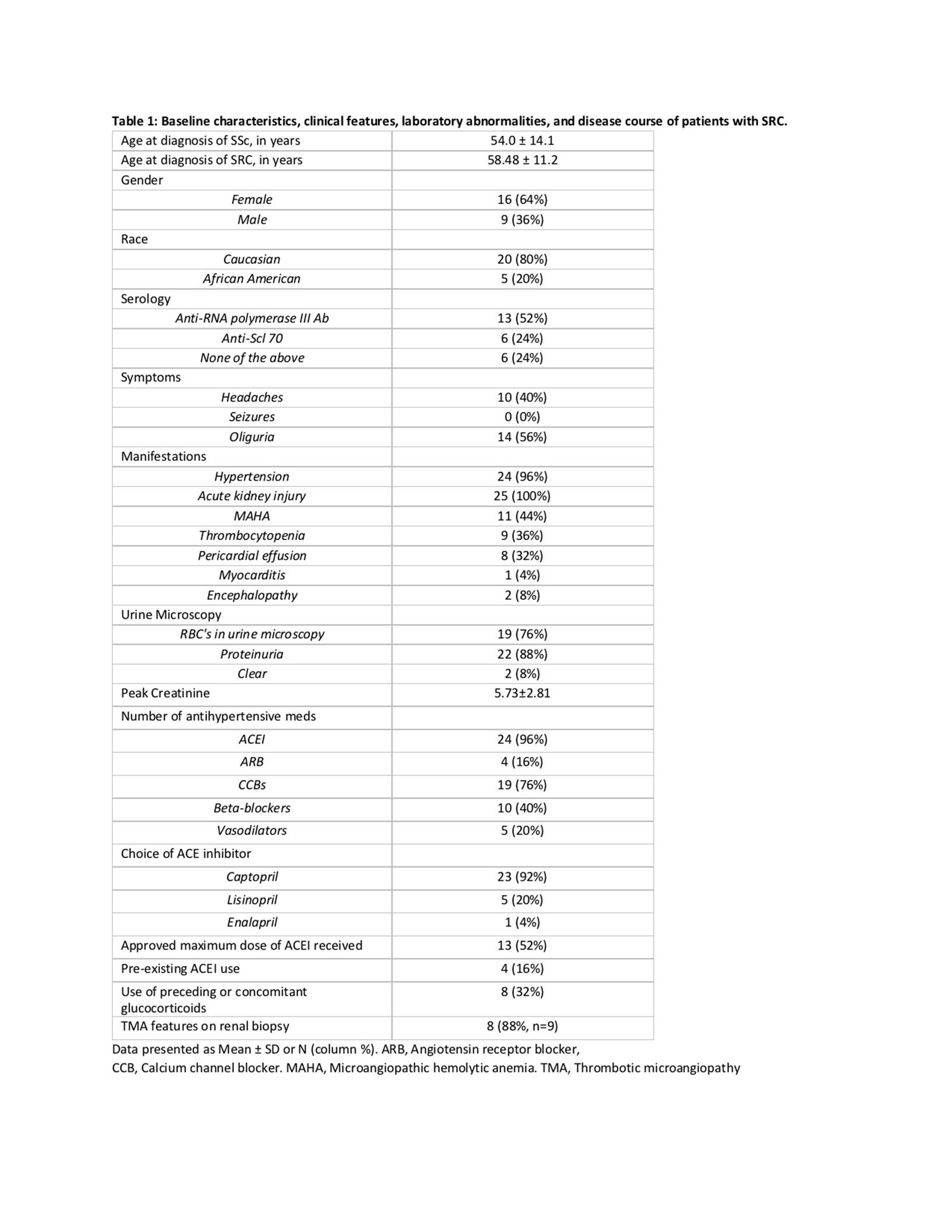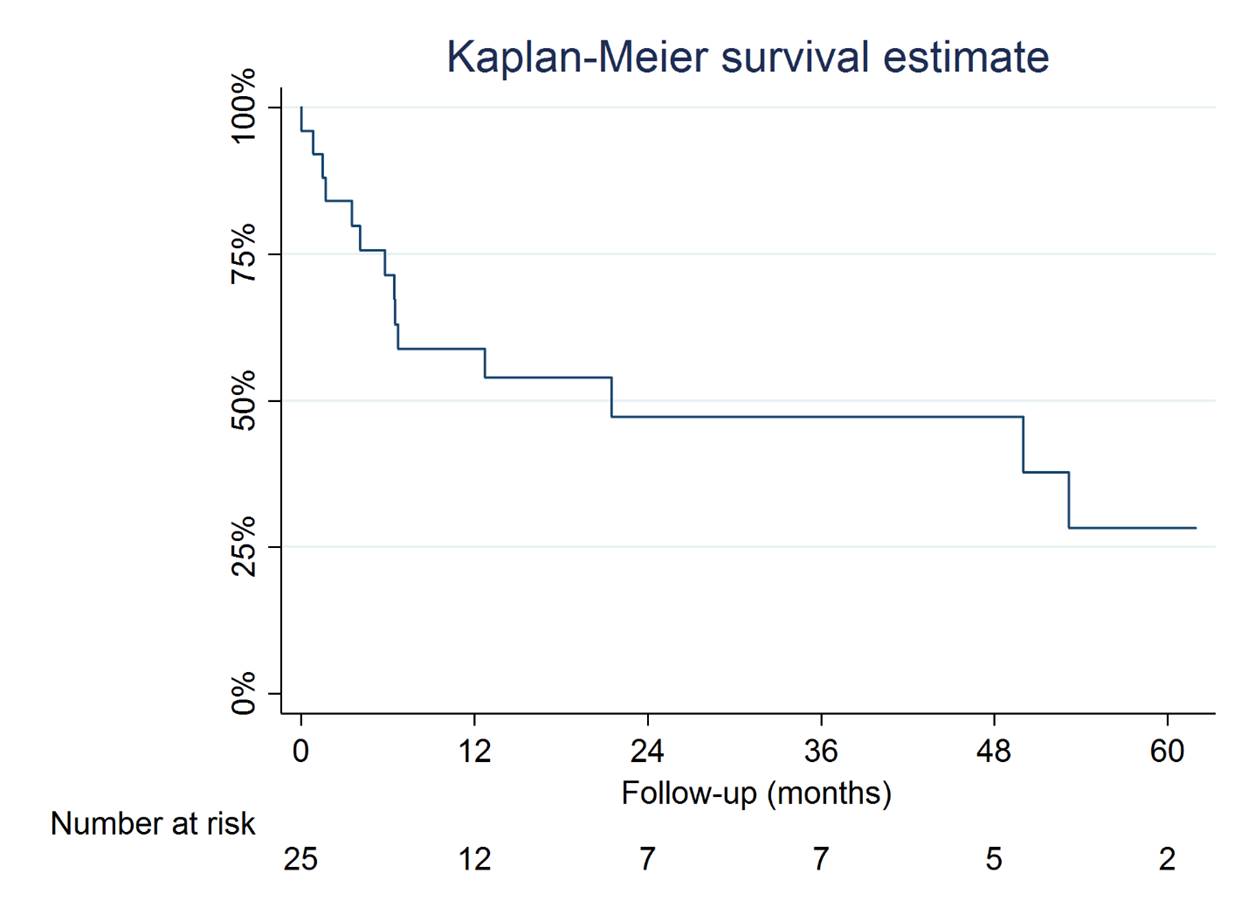Session Information
Date: Tuesday, October 23, 2018
Title: Systemic Sclerosis and Related Disorders – Clinical Poster III
Session Type: ACR Poster Session C
Session Time: 9:00AM-11:00AM
Background/Purpose: Scleroderma renal crisis (SRC) is a rare complication of patients with systemic sclerosis (SSc). ACE inhibitors (ACEI) favorably alter the natural history of this condition. However, clinicians are wary of initiating this therapy because of a rising serum creatinine. There is paucity of data on the association between the time of initiation of therapy and long-term outcomes. We evaluated the effect and timing of treatment on long term outcomes in patients with SRC.
Methods: We screened 393 adult patients with SSc (fulfilling 2013 ACR/EULAR criteria) in our institution from 2004 to 2/2018 of which 25 satisfied the diagnosis of SRC, as defined by Steen et al1. Data on patient demographics, clinical presentation, serology, time to initiation of therapy, and type of therapy were evaluated. We evaluated the following outcomes: mortality, need for dialysis and partial or complete renal recovery. Follow up was censored on May 11th, 2018. Continuous variables were expressed as mean ± SD. Discrete variables were expressed as mean (%) and compared with chi-squared tests. Kaplan-Meier curves were used to describe long term survival estimates. A two-tailed p-value of less than 0.05 was considered significant for all statistical testing.
Results: Our cohort included 25 patients with SRC of which one patient was normotensive; 63% were females and mean ages at diagnoses of SSc and SRC were 54 ± 14.1 years and 58 ± 11.2 years respectively; 96% of the patients were treated with ACEI including 16% who were already on one. Baseline characteristics, clinical features, and disease course of patients with SRC are shown in Table 1. At one year, mortality was 41.2%; 52% (13/25) required dialysis. Of which one patient was able to discontinue dialysis after 25 days. Dialysis requirement was significantly higher in those who were started on ACEI >48 hours after onset of clinical manifestations (78.6% vs 16.7%, p= 0.018). Kaplan-Meier survival estimates at 5 years follow up are shown in Figure 1.
Conclusion: Early (≤ 48 hours) initiation of ACEI in patients with SRC significantly reduces need for dialysis. However, irrespective of the timing of initiation of therapy, the long-term mortality of patients with SRC remains high.
Reference:
1. Steen VD, Medsger TA. Long-Term Outcomes of Scleroderma Renal Crisis. Ann Intern Med. 2000;133:600–603.
Figure 1: Kaplan-Meier survival estimates at 5 years follow up
To cite this abstract in AMA style:
Patel A, Banerjee K, Chatterjee S. Delay in Initiation of Therapy Predicts Worse Outcomes in Scleroderma Renal Crisis [abstract]. Arthritis Rheumatol. 2018; 70 (suppl 9). https://acrabstracts.org/abstract/delay-in-initiation-of-therapy-predicts-worse-outcomes-in-scleroderma-renal-crisis/. Accessed .« Back to 2018 ACR/ARHP Annual Meeting
ACR Meeting Abstracts - https://acrabstracts.org/abstract/delay-in-initiation-of-therapy-predicts-worse-outcomes-in-scleroderma-renal-crisis/


